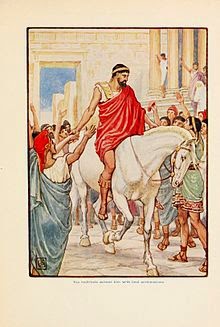 |
| Map of the Peloponnesian War 435-404 B.C. |
According to Thucydides in his “History of the Peloponnesian War”, Spartan militia feared the rising power of democratic and expansionist Athens.
Thucydides’ writings relied on the testimony of eyewitnesses and his own experiences as a general during the war.
It is important, therefore, to take into consideration that the text of Thucydides is a starting point for understanding the analysis of power politics on the one hand, and political practice that has dominated much of the history of international relations, on the other.
 |
The multitude saluted Lysander for his victory over
Atenians
|
For example, applying "realistic" policy (Realpolitik) currently allows us to understand the behavior of US foreign policy: "No need to ask permission from the UN to invade Iraq" and "The United States reserves the right to pre-emptive strikes against countries that pose a threat to national security "…



No hay comentarios:
Publicar un comentario